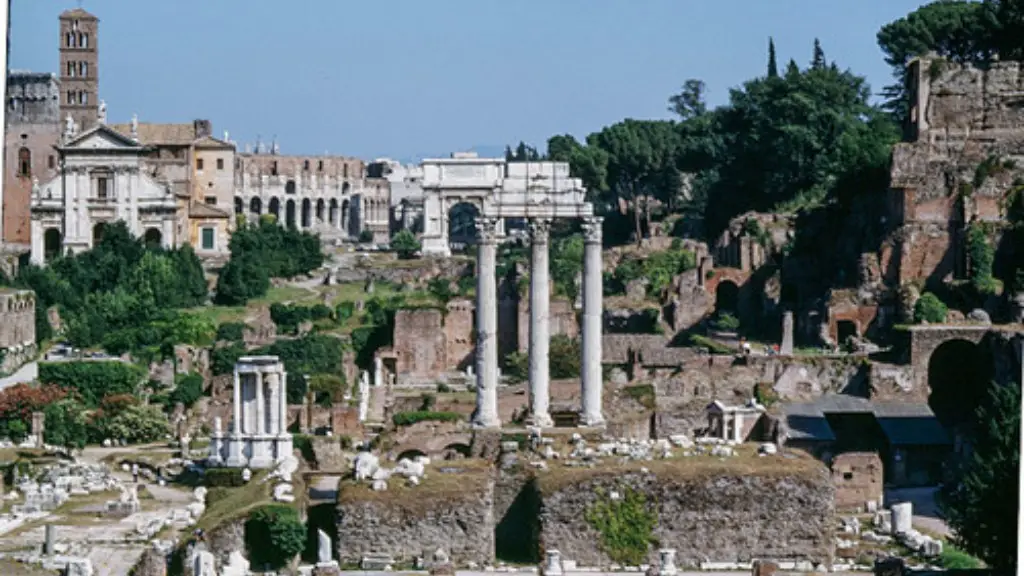Introduction
Legislation in Ancient Rome used a system of government that gave the Roman people the power to pass laws by voting. This system was in place for centuries, ever since the Roman Republic began in 509 BCE. It was an important part of the Republic and the Roman Empire, with the Senate of Rome and its assemblies playing an important role in the legislative process. This article will explore the process of how legislation was passed in Ancient Rome, the methods used to ensure that laws were followed, and the impact of legislation on Roman society.
Organization of Legislation
In Ancient Rome, the Senate of Rome was responsible for framing and proposing legislation. The Senate was made up of members from the patrician class, with different levels of representation depending on their families’ wealth and prestige. Their decisions were then presented to the various assemblies, where the people of Rome had the right to vote and approve them. The assemblies included the Comitia Centuriata, the concilium plebis, and the concilium curiata. The power to approve and pass laws ultimately lay with the people of Rome.
Role of the Magistrates
Magistrates played an important role in the process of passing legislation in Ancient Rome. They could propose legislation, and their decisions could be overruled or challenged by the people in the assemblies. The magistrates were responsible for ensuring that the laws were followed and enforced. In addition, they acted as mediators between the Senate and the people of Rome, ensuring that everyone was heard and respected in the law-making process.
Enforcement of Legislation
The Roman Republic had a system of laws and punishments for those who violated them. Courts were set up to resolve disputes and carry out punishment where necessary. It was the job of the magistrates to ensure that laws were followed, and punishments were meted out if necessary. This system of laws and punishments ensured that people were held accountable for their actions and gave the people of Rome a sense of security.
Impact of Legislation on Roman Society
The Roman system of government was highly influential in the development of Western legal principles. It was the first time in history that a system of government gave the people of a nation the right to pass laws and have them enforced. This system allowed the people of Rome to have a say in their own governance and to create a society that was based on justice, respect, and stability. Roman law also had a major impact on other nations. The concepts of natural law and legal rights, which are essential elements of constitutional law, were derived from Roman law.
Role of Religion in Legislation
Religion played an important role in legislation in Ancient Rome. The Roman gods were believed to have the power to influence the laws and institutions of the Roman Republic. Religion was used to legitimize and sanctify Roman laws, as it was believed that the gods had decreed them. This meant that laws had a moral aspect, as well as being legally enforceable. This gave Roman laws a higher purpose than just being enforced for the benefit of the ruling class.
Conclusion
The process of passing legislation in Ancient Rome was a complex and important part of the Roman Republic and the Roman Empire. Laws were proposed by the Senate, voted on in the various assemblies, and then enforced by the magistrates. Religion played an important role in legitimizing and sanctifying the laws. The Roman system of law-making and enforcement had a significant impact on the development of Western legal principles, as well as influencing other nations.
Impact of Legislation on Roman Law
The impact of legislation on Roman law was significant. The Roman legal system was the first in history to codify laws and punishments. This provided the foundation for constitutional law, and the concept of natural law was derived from the Roman legal system. Roman law also influenced other nations, including parts of Europe, and inspired the development of the English Common Law legal system.
The codification of laws had a profound effect on Roman society. It provided a sense of rigour and stability in everyday life, while also allowing people to challenge laws if they felt they had violated their rights. This gave the Roman people confidence in the fairness of their legal system, and allowed them to have a say in the laws that were passed.
Another important factor of Roman law was the focus on individual responsibility. Each individual was accountable for their actions, with laws designed to punish those who violated them. This ensured that laws were taken seriously, and gave citizens a sense of security in knowing that the laws would be respected and seen as authoritative.
Roman law also gave rise to the concept of individual rights. The concept of personal liberty was enshrined in Roman law, with the idea that everyone should have the right to pursue their own interests, as long as it does not infringe on the rights of others. This idea had a major impact on Western legal systems, as it provided a framework for individual rights that are still respected and upheld today.
Methods and Tools Used to Enact Legislation
In order to enact and enforce legislation in Ancient Rome, a number of methods and tools were used. These included the Senate of Rome and the various assemblies it presented legislation to, as well as the tribunes who acted as mediators between the Senate and the people.
The Senate of Rome had the power to frame and propose legislation. All laws proposed by the Senate had to be approved by the people of Rome in the various assemblies. The assemblies included the Comitia Centuriata, the concilium plebis, and the concilium curiata. These assemblies also allowed for debate and amendment of proposed laws, and therefore were an important part of the legislation process.
Another important tool used in Ancient Rome was the tribunes. The tribunes acted as mediators between the Senate and the people, and had the power to intervene and stop certain laws from being passed if the people voted against them. They also had the power to bring issues to the attention of the people, allowing them to debate and decide the fate of certain laws.
The process of enacting legislation was also aided by the magistrates, who had the power to enforce laws and ensure that they were followed. Magistrates also had the authority to settle disputes between people and challenge laws that they deemed unjust.
Role of Religion in Legislation
Religion played an important role in legislation in Ancient Rome. The Roman religion was deeply entrenched in the legal system and the process of creating laws. It was believed that the gods had the power to influence the laws and institutions of the Roman Republic. This meant that laws had a moral aspect as well as being legally enforceable, as the gods were believed to have decreed them. This provided a sense of legitimacy and sanctity to the laws.
The gods were also believed to be able to punish those who violated the laws, and so it was important for people to obey them. This gave the laws an authority that went beyond just the laws of the land. It provided a sense of moral and spiritual guidance, ensuring that people took the laws seriously.
Religion also provided an avenue for reform and change. People could appeal to the gods to challenge laws they thought were unjust, as the gods were believed to have the power to intervene. This provided people with a sense of hope, as they could appeal to something higher than themselves to change the laws.
Legacy of Roman Legislation
The process of passing legislation in Ancient Rome had a major impact on the development of Western legal systems. The concept of natural law, which is still widely respected in the West today, was derived from the Roman legal system. Another important element of Roman law was the focus on individual responsibility and personal liberty, which also has a major influence on Western law.
The influence of Roman law can also be seen in other nations and cultures. Many countries in Europe and the Middle East have adopted elements of Roman law in their own legal systems, while the influence of Roman ideals can be seen in other countries, such as the United States. Roman law and ideals are still widely respected and upheld today.
The legacy of Roman legislation has lasted through the centuries and continues to influence modern legal systems. It is a testament to the sophistication and sophistication of the Roman Republic and the Roman Empire, and provides a valuable insight into the history of law-making and governance.





